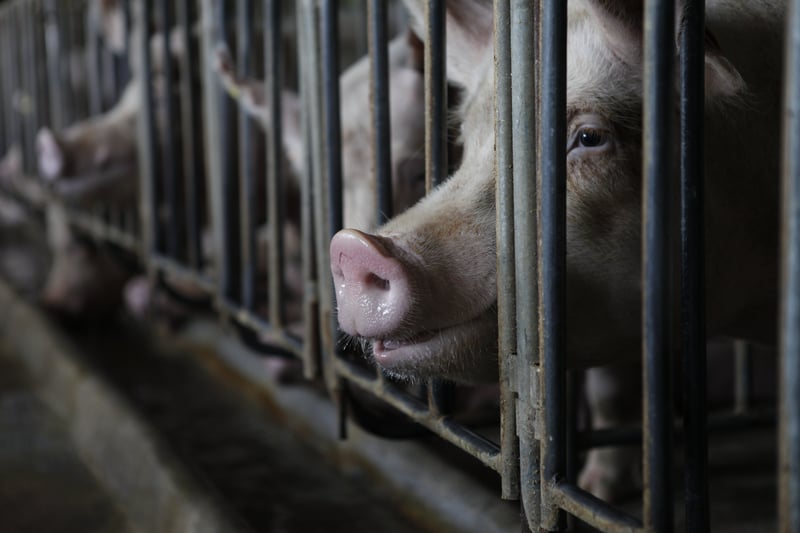
Kentucky Ag-Gag: Legislators Are Trying to Hide What Happens in Factory Farms
Blog
For years, the animal agriculture industry has been trying to criminalize undercover investigations exposing the cruelties inflicted on farmed animals for profit.
Kentucky legislators passed SB 16 (which was recently vetoed by the Kentucky governor), a dangerous ag-gag bill which would criminalize photos and videos taken in factory farms across the state. The legislation, which would “prohibit the operation of unmanned aircraft, video or audio recording devices, or photography equipment” also extends to drone videos that expose the operations of cruel factory farms from the air.
Ag-gag laws such as this one intend to hinder an individual or group’s ability to investigate, document, and publicize the conditions and abuses on factory farms. As the name suggests, this law would “gag” whistleblowers and undercover activists through criminal punishments for educating the public about animal cruelty.
Undercover investigations are crucial to exposing and preventing animal cruelty in concentrated animal feeding operations and have led to major corporate policy changes, fines, and even convictions for those who go out of their way to increase the abuse animals endure on factory farms.
Undercover investigations by many animal protection groups have found animals being kicked, punched, doused in the face with high-powered hoses, sexually assaulted, and scalded alive. Investigations are vital to exposing the realities of the standard practices animals endure for the agriculture industry—such as mutilations, cramped conditions, and ultimately death.
While some states, including Washington, California, Colorado, Minnesota, and Illinois have tried and failed to pass ag-gag laws, several other states have passed ag-gag laws in recent years, some of which have fortunately been struck down as unconstitutional. Despite this, the animal agriculture industry continues to get away with nearly zero transparency.
Legislators who have put ag-gag bills forward have been forthcoming about their intentions with the legislation: that Americans would see the cruel reality of factory farms and want to ban them. The law’s intent to suppress real, accurate pictures and videos depicting how animal-based food products are produced is based on fears that the industry cannot survive if the cruelty of its operations becomes public.
Sadly, not a single US federal law provides protection to animals during their lives on factory farms—leaving these animals vulnerable to egregious cruelty. Ag-gag laws would further inhibit the expansion of knowledge about how these factories operate.
Not only will these laws embolden those who take extra steps to abuse farmed animals—as nobody would be able to report it for fear of criminal charges themselves—but they further put public health at risk.
The Center for Disease Control (CDC) stated in a report that ag-gag laws could “suppress investigations that lead to the identification of hazards,” directly in conflict with federal protections of workers who collect water sampling data or report environmental contamination to the federal government. The 2013 Safe Meat and Poultry Act, passed by the US Department of Agriculture (USDA), ensures whistleblower protections to workers if they decide to collect and report food safety data without their employer’s permission and jeopardize information sharing that has historically informed national food safety and regulation efforts.
If you’re disgusted with the cruelty animals exploited on factory farms are forced to endure, take steps to reduce or eliminate your meat consumption today and urge your federal legislators to co-sponsor the Farm System Reform Act, which would put a moratorium on factory farms throughout the US.